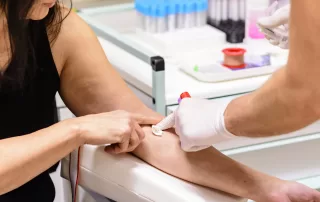Chlamydia assessment
Welcome to Qoctor’s online doctor service which can provide assessment/treatment for Chlamydia, in suitable cases. This telehealth assessment is only suitable for people who have had a known exposure to a positive case but are symptom-free. Answer some online questions, then book a consultation with an AHPRA-registered doctor.
The consultation fee is $29.99. If a prescription is advised, it can be sent as an eScript to your phone OR electronically to your local pharmacy. Alternatively you can have medication delivered by an Australian partner pharmacy- in this case, the cost of medication is added at the checkout. All treatment and advice is issued subject to your doctor’s assessment.
About Chlamydia
- Chlamydia is a common sexually transmitted infection.
- It is spread by oral, vaginal or anal sex.
- It can be a silent infection, though it can cause complications for both men and women, even when there are no obvious symptoms.
- If you’ve had a positive chlamydia test (or you’ve had sexual contact with someone who has had a positive chlamydia test), you should seek immediate assessment and/or chlamydia treatment.
- You can book in for a general GP appointment (for $49.99) HERE should you wish to discuss this.

FAQs about Chlamydia
Chlamydia is a bacterial infection that is spread through sexual contact- oral, anal or vaginal. In most cases it is a silent condition, with no symptoms- this means it’s important for people who are sexually active to have regular testing.
Symptoms of Chlamydia in women
- most women with Chlamydia will have no symptoms- i.e. it is often a silent infection
- a change in vaginal discharge- it may increase in amount, and become yellow-green, brown, and smelly.
- bleeding between periods or after sex
- pain during sex
- pelvic pain
- a burning sensation when passing urine
- pelvic inflammatory disease (PID), which may involve fever, pelvic pain and general unwellness
- complications such as reduced fertility and a higher risk of ectopic pregnancy
Symptoms of Chlamydia in Men
- most often there are no symptoms of Chlamydia in men- it is silent
- a burning sensation when passing urine
- pain or ache in the testicles
- a discharge from the penis
- over time, it can reduce fertility (if untreated)
A chlamydia test usually involves a urine sample, or sometimes a swab (of the vagina or urethra). Other tests may be recommended if you have had anal or oral sex. There are a number of other STIs you may wish to be checked for that may involve additional tests. When infection is highly suspected, treatment for Chlamydia should be started without delay before test results are available. Rapid chlamydia treatment reduces the risk of complications in the future.
Chlamydia treatment involves taking an antibiotic. The choice of antibiotic and the duration of the antibiotic course depends on the severity of infection and whether a person has any particular allergies to antibiotics. In uncomplicated or mild infections, the antibiotic course is usually quite brief. A doctor or sexual health clinic can arrange assessment and treatment for Chlamydia if necessary. If symptoms do not get better after taking an antibiotic, or of they go away but then return, it is very important to get reassessed and retested. It is generally recommended to get retested 3 months following treatment, as reinfection is quite common.
Due to the high rate of re-infection, it’s advised to get tested again after 3 months. Anyone who is sexually active should continue to get tested regularly, particularly if you have multiple sexual partners.
If you’ve tested positive for Chlamydia, ideally you should let your recent sexual partners know, so they can be tested and treated too. They may have silent infection but no symptoms of chlamydia, so they may be completely unaware. Even silent infection can cause long term damage and complications. You can arrange contact tracing anonymously if needs be, via www.letthemknow.org.au .
Health Library- Sexual Health
Sexually Transmitted Infections (STIs) are very common – so it’s wise to be well-informed and proactive about sexual health.
Many STIs can be silent- in women, Chlamydia may present with abnormal vaginal discharge, unscheduled vaginal bleeding or pelvic pain-but sometimes there are no symptoms at all. Even silent infection can cause serious health problems- therefore, it’s important to consider having a regular chlamydia test if you’re sexually active, particularly if you have multiple partners. In men, there may also be no symptoms, though some may experience a burning sensation when passing urine, discharge from the penis or discomfort in the testicles- even if there are no symptoms, chlamydia treatment is important, to prevent complications and passing infection to others. A chlamydia test usually just involves a simple urine sample, though sometimes a swab may be recommended. In uncomplicated cases, chlamydia treatment usually involves a short course of antibiotics. In general, treatment for chlamydia tends to work extremely well, but retesting after 3 months is usually advised to make sure there has been no reinfection.
People who are sexually active should consider regular STI screening- obviously, the more partners one has, the more often check ups are recommended. Full testing may involve urine tests, swabs and blood tests. If you’ve got an STI, it’s important to inform previous partners who may also be affected. If you are not able to do this directly or in person, you can do it anonymously at www.letthemknow.org.au
If you have further questions about how to treat chlamydia, or how to to get a chlamydia test, speak to your GP or sexual health clinic. And for more helpful information about STIs and sexual health, browse the articles below.
HIV Self-Testing: How It Works and What You Should Know
HIV Self-Testing: How It Works and What You Should Know Human immunodeficiency virus (HIV) is commonly checked as part of a routine sexual health check, either through your GP or a sexual health clinic. However, HIV self-testing has emerged as a convenient and private alternative for those who prefer to test at home. Book an STI test consultation HIV statistics and risk factors HIV is a virus you can contract through sex or blood-to-blood transmission. It commonly does not have any symptoms initially but over time can affect your immune system and put you at increased risk of certain cancers and infections. According to 2020 statistics, 2,610 people were unaware they had HIV in Australia. Risk factors for getting HIV include being a man who has sex with other men or using intravenous drugs. However, anyone [...]
Balanitis: Signs, triggers, and how to treat it
Balanitis: Signs, triggers, and how to treat it Balanitis is inflammation of the head of the penis (glans). It can cause symptoms such as irritation of the glans, redness, discomfort, swelling, small spots or discharge that is white and thick (or cheesy). There are many causes of balanitis, including dermatitis, irritants, fungal infection, bacterial infection, physical rubbing, yeast infection, poor hygiene, and also overzealous cleaning. Book a GP appointment Risk factors for balanitis Balanitis is much more likely to occur in men who are uncircumcised because the glans is covered by the foreskin, which creates a moist, closed, and warm environment for bacteria and fungi to overgrow. Balanoposthitis: A related condition Another condition, balanoposthitis, means inflammation of the foreskin and glans, which has the same triggers and causes as balanitis. [...]
Syphilis
Syphilis As one of the oldest sexually transmitted infections (STI) still present today, syphilis continues to make its mark in the 21st century. In 2023, there were over 8,000 notifications for syphilis in Australia, up from over 2,000 in 2010. Worldwide in 2022 there were 8 million adults with syphilis and 700,000 babies born with congenital syphilis. It is an infection that has famously been claimed to have affected Casanova, Oscar Wild, Fyodor Dostoevsky, Ludwig van Beethoven and Vincent Van Gough, while also creating tension between kingdoms and countries in the past. Book an STI test So, what is syphilis? It is a bacteria that can be transmitted during sex through the mouth, penis, vagina and anus. It can also be transmitted in blood transfusions, intravenous drug use and pregnancy. In Australia, there are higher rates [...]



